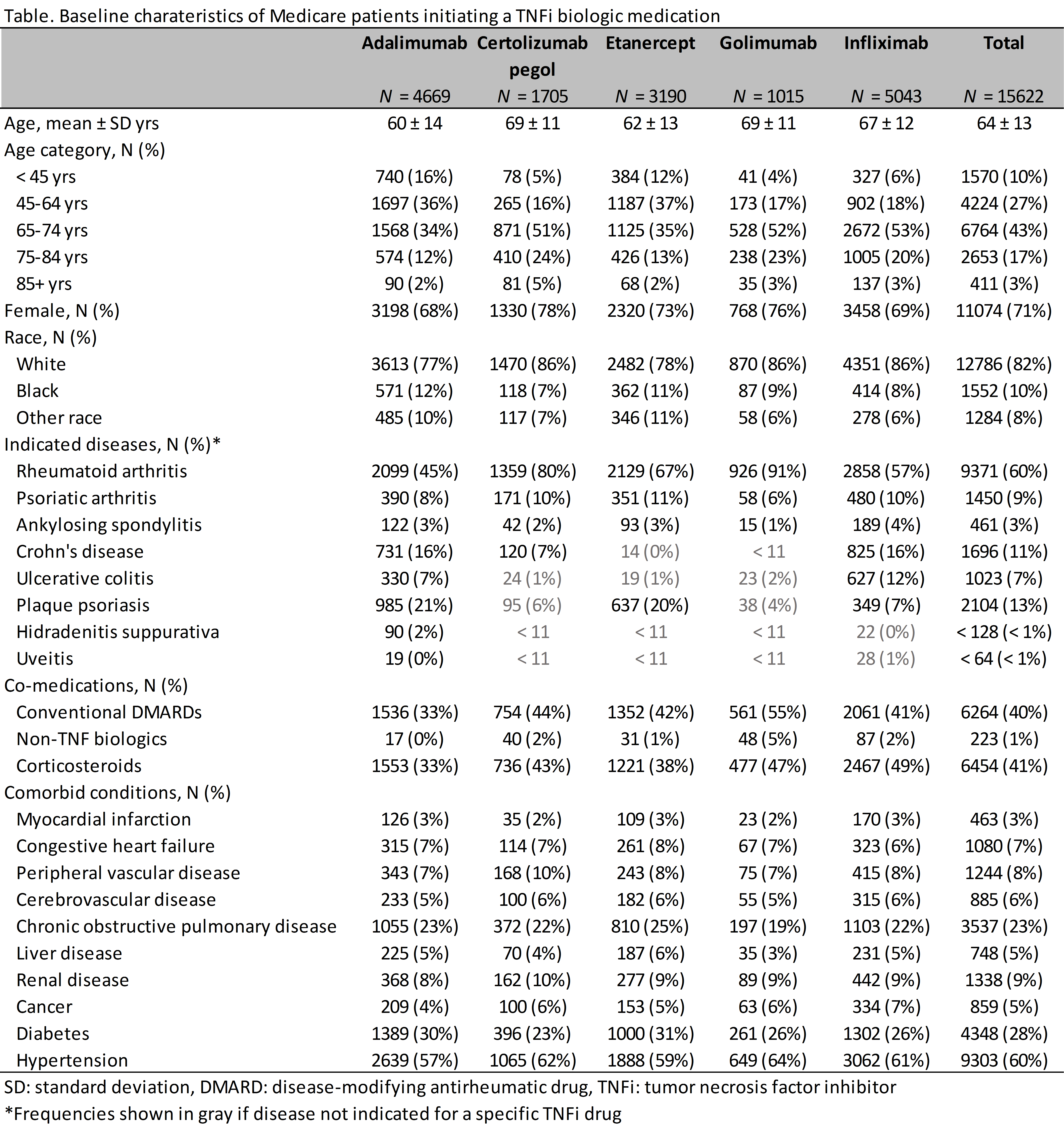Session Information
Session Type: ACR Poster Session A
Session Time: 9:00AM-11:00AM
Background/Purpose: Use of tumor necrosis factor inhibitor (TNFi) drugs is common among patients with rheumatic disease who do not respond to conventional therapies. The aims of this study were to (i) characterize the use of, and (ii) investigate factors associated with non-persistence to TNFis in a contemporary database of Medicare beneficiaries.
Methods: This study used claims data from 2010-2016 from a 20% Medicare sample. We identified all patients whose first (i.e., index) TNFi use occurred between 2011-2016 based on the presence of one or more Medicare Part D prescription or Part B injectable/IV drug claims for adalimumab, certolizumab pegol, entanercept, golimumab, or infliximab. To identify baseline covariates, we required that patients have Medicare Parts A/B and D coverage for a baseline period of at least one year prior to the index TNFi claim. Comorbid conditions were defined based on a diagnosis code in at least one inpatient or two outpatient claims separated by 30 days or more. We defined non-persistence as a gap in supply of the index TNFi of more than 180 days. Factors associated with the rate of non-persistence were assessed using multivariable Cox proportional hazards regression.
Results: We identified 15,622 patients initiating a TNFi from 2011-2016, with infliximab being the most common and golimumab the least common (Table). Mean age was 64 ± 13 years and 71% were female. History of rheumatoid arthritis (60%) was the most common TNFi indication, and 40% of patients had baseline concomitant use of each of conventional DMARDs and corticosteroids. Among 8,147 patients with rheumatoid arthritis and two or more TNFi claims, over a mean of 16.1 months of follow-up, we identified 2,937 (36%) patients who were non-persistent with the index TNFi. Female sex, chronic obstructive pulmonary disease, and hypertension were associated with a higher rate of non-persistence, and age 65-74 years and concomitant DMARD use were associated with a lower rate of non-persistence (Figure). In comparison to initiators of infliximab, rates of non-persistence were higher among initiators of adalimumab, certolizumab pegol, and etanercept, and lower among initiators of golimumab.
Conclusion: TNFis are used among a diverse set of Medicare beneficiaries. In TNFi initiators with rheumatoid arthritis, there were differences in the rate of non-persistence by sex, age, co-medication, comorbid disease, and the type of TNFi. These findings suggest that there may be differences in the benefit and harm profiles (e.g., therapeutic response or adverse complications), or patient preferences in drug administration (e.g., once-monthly dosing for golimumab), between the TNFis.
To cite this abstract in AMA style:
Roetker NS, Peng Y, Nieman KM, Li S, Gilbertson DT. TNF Inhibitors: Prevalence of Use and Predictors of Treatment Non-Persistence in the 2011-2016 Medicare Population [abstract]. Arthritis Rheumatol. 2018; 70 (suppl 9). https://acrabstracts.org/abstract/tnf-inhibitors-prevalence-of-use-and-predictors-of-treatment-non-persistence-in-the-2011-2016-medicare-population/. Accessed .« Back to 2018 ACR/ARHP Annual Meeting
ACR Meeting Abstracts - https://acrabstracts.org/abstract/tnf-inhibitors-prevalence-of-use-and-predictors-of-treatment-non-persistence-in-the-2011-2016-medicare-population/


